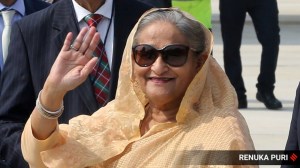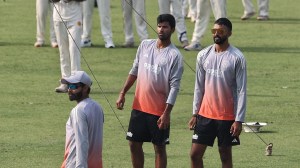Solzhenitsyn, literary giant who defied soviets, dies at 89
Aleksandr Solzhenitsyn, whose stubborn, lonely and combative literary struggles gained the force of prophecy...

Aleksandr Solzhenitsyn, whose stubborn, lonely and combative literary struggles gained the force of prophecy as he revealed the heavy afflictions of Soviet Communism in some of the most powerful works of the 20th century, died late on Sunday at the age of 89 in Moscow.
His son Yermolai said the cause was a heart ailment.
Solzhenitsyn outlived by nearly 17 years the Soviet state and system he had battled through years of imprisonment, ostracism and exile.
Solzhenitsyn had been an obscure, middle-aged, unpublished high school science teacher in a provincial Russian town when he burst onto the literary stage in 1962 with A Day in the Life of Ivan Denisovich. The book, a mold-breaking novel about a prison camp inmate, was a sensation. Suddenly he was being compared to giants of Russian literature like Tolstoy, Dostoyevski and Chekhov.
Over the next five decades, Solzhenitsyn’s fame spread throughout the world as he drew upon his experiences of totalitarian duress to write evocative novels like The First Circle and The Cancer Ward and historical works like The Gulag Archipelago.
Gulag was a monumental account of the Soviet labour camp system, a chain of prisons that by Solzhenitsyn’s calculation some 60 million people had entered during the 20th century. The book led to his expulsion from his native land. George F Kennan, the American diplomat, described it as “the greatest and most powerful single indictment of a political regime ever to be leveled in modern times”.
Solzhenitsyn was heir to a morally focused and often prophetic Russian literary tradition, and he looked the part. With his stern visage, lofty brow and full, Old Testament beard, he recalled Tolstoy while suggesting a modern-day Jeremiah, denouncing the evils of the Kremlin and later the mores of the West. He returned to Russia and deplored what he considered its spiritual decline, but in the last years of his life he embraced President Vladimir V Putin as a restorer of Russia’s greatness.
In almost half a century, more than 30 million of his books have been sold worldwide and translated into some 40 languages. In 1970 he was awarded the Nobel Prize in Literature.
Solzhenitsyn owed his initial success to Khrushchev’s decision to allow Ivan Denisovich to be published in a popular journal. Khrushchev believed its publication would advance the liberal line he had promoted since his secret speech in 1956 on the crimes of Stalin. But soon after the story appeared, Khrushchev was replaced by hard-liners, and they campaigned to silence its author.
The dissident writer
Born December 11, 1918, in Kislovodsk. Served as the commander of an antiartillery unit of the Red army during WWII. A graduate from the Department of Physics and Mathematics at Rostov University
Arrested for writing derogatory remarks about Stalin and sentenced to eight years in a labour camp followed by permanent internal exile. He had referred to Stalin as “the whiskered one”, Khozyain (The Master) and Balabos (boss)
His first book, One day in the life of Ivan Denisovich is essentially about his experiences in the Ekibastuz camp in Kazakhstan. The book, published in 1962 by order of Soviet leader Nikita Khrushchev, gained national as well as international recognition
The First Circle, a book about inmates in one of Stalin’s “special camps” for scientists who were deemed politically unreliable but whose skills were essential
His non-fiction Gulag Archipelago trilogy, written between 1958 and 1968 published in the west in 1973, describes the savagery of the Soviet state under Stalin. It helped dispel the lingering sympathy nurtured by a few leftist intellectuals, especially in Europe
The Cancer Ward, released in 1967. A book written about his cancer treatment in Tashkent, Uzbekistan. Even the short story The Right Hand is based on the same
After Khrushchev was ousted in 1964, Solzhenitsyn was hounded by the KGB and subsequently expelled from the Soviet Union in 1974 only to return in 1994
After his return, he settled in a secluded Russian village where The Red Wheel, a multivolume saga of Russian history was written
Awarded the Nobel prize in literature in 1970 and the Templeton Prize in 1983
The last book, Two Hundred Years Together, released in 2001 addressed the complex emotions of Russian-Jewish relations. The book was criticized for alleged anti-Semitic passages which the author denied
Awarded Russia’s highest honour, the Order of St Andrew, which he refused to accept



- 01
- 02
- 03
- 04
- 05




























